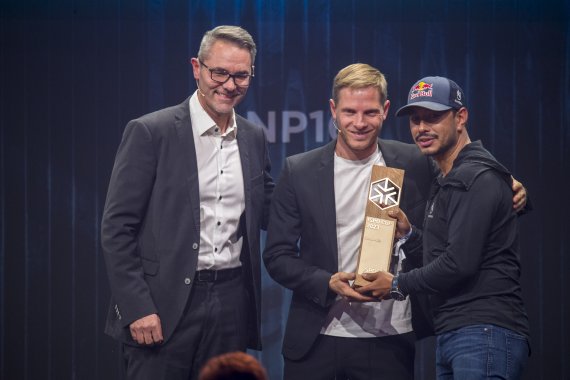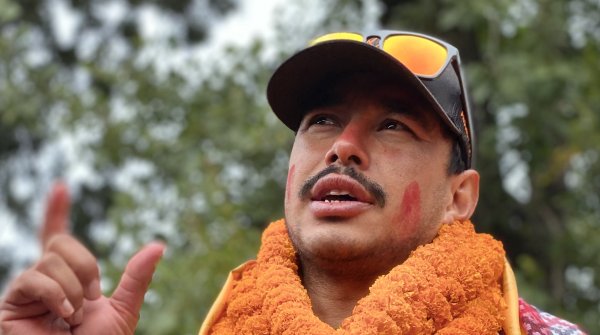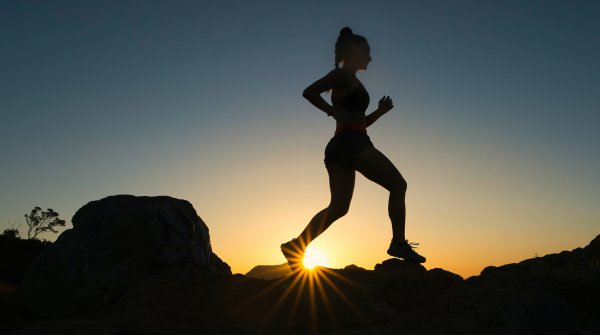- How was your year and how is the Big Mountain Cleanup project going?
- How do you plan to raise the funds?
- What successes can you report so far?
- Why is the project so important to you?
- What do you find and how do you manage to get the stuff off the slopes?
- What about the environmental awareness of the Nepalese?
- Your latest project is intended to provide long-term support for the helpers of the expedition...
- What drives you?
- What do you think about when you're battling the forces of nature in the death zone?
- Could you actually take anyone to an 8,000-meter peak?
- Do you want to get it back from Kristin Harila? Maybe without oxygen?
- Do you already have plans for a new adventure?
Nimsdai Purja: To be honest, it has been a very challenging year for me. I worked hard and guided people up the big mountains for eleven months. In the process, I had to accept the loss of two friends on Shishapangma. That hit me hard. The Big Mountain Cleanup project is also challenging. It's not just about removing the garbage from a particular season, but about dealing with the masses of garbage since the start of mountaineering in the Himalayas. The hardest part is getting the necessary funding to cover the cost of skilled labor, especially for the Sherpas who do the cleanup.
We hope to attract major donors who can support the project financially. Although we have the manpower and the know-how, the financial resources are crucial for the sustainable success of the clean-up work.
We have recovered a considerable amount of garbage. During the last two Big Mountain Clean Ups of the Nimsdai Foundation on Everest and K2, a total of 1,124 kg of waste was removed. This is equivalent to the amount of waste produced by three British households per year. It just goes to show: We can make a difference when we work together. Next year we will return to clean up on Everest. But the real success lies in developing guidelines with the government and working with agencies such as the Nepalese military, which adds value to our efforts.
I see the effects of climate change on the mountains first hand: glaciers are turning into lakes within ten years. This has a huge impact on the downstream areas. We need to act together now. Because Mountain ecosystems are of enormous importance for our home, the earth. They are home to 15% of the world's population, contain half of all biodiversity hotspots and supply half of the world's population with fresh water. However, the mountains are also threatened by climate change, overexploitation and pollution. We all need to do our part and work together to protect our home. What happens in the mountains affects us all.
The waste includes abandoned tents, oxygen bottles, food containers, discarded equipment and, of course, human waste. The pollutants from this waste are washed into the rivers by rain and snowmelt and contaminate the water supply for the local population, posing a serious health risk. In addition, there are still numerous old ropes that need to be removed to prevent avoidable injuries and deaths caused by climbers accidentally clipping into old, rotten and forgotten ropes. We have the manpower and resources to bring the garbage down. But the bigger problem is the lack of recycling experts in Nepal. We are actively seeking support for recycling initiatives to ensure that the waste is processed properly. The idea is to turn it into something new, like new clothes. But recycling is virtually non-existent in Nepal.

Unfortunately, it's not very pronounced yet. Education is crucial, and that is one of the main focuses of our foundation. We need to educate people about the importance of environmental responsibility and sustainable practices. But Nepal is a poor country and tourism is an important source of income. Therefore, we need to ensure that tourism in the Himalayas becomes more sustainable. This starts with the guidelines of the guiding companies. For example, we use a solar system to power the base camp and have strict "clean as you go" and "leave no trace" protocols for our expeditions. It is crucial that both the companies and their customers are aware of the environmental impact of their actions and support initiatives such as offsetting CO2 emissions. The most important thing is to raise awareness of responsible tourism - among everyone involved.
Exactly, the porters are the backbone of our community and our "Project Horizon" porters lodge aims to provide them with better working and living conditions. We want to build porter houses all over the country at altitudes above 5,000 meters and ensure fair wages for the porters. They carry bags, equipment and supplies up and down the trails. So far, there is no permanent accommodation for them where they can rest and warm up. After their work is done, they usually hike another three hours back to their home village. We will build our first Porters Lodge for 100 people in Lobuche in 2024. The building will be constructed with local materials and local expertise, it will use renewable energy and honor the heritage and history of the porters. It will be a special place, a community center for overnight stays, with a café that can be used by trekkers, Sherpas and porters. The proceeds can help support the local economy and provide employment opportunities for local people.
I believe that being motivated or getting motivation from others is not enough in life. You have to be motivated yourself, you have to have this discipline within yourself. For example, if you're on a sports team and the coach forces you to train, that's good, but you have to have the self-discipline to go out and train.
For me, it comes alive in the mountains. I find peace there. The noise of life at sea level fades and there is only the climb and the mountain. You have to be completely focused and aware of your surroundings. As an expedition leader, I have to take into account all the micro changes in the weather, look after the team and know how they are doing, and make sure everyone is motivated and safe. My years with the British Gurkhas, the UKSF and my ongoing ventures such as K2 in winter, 14 Peaks and running my companies have taught me how to manage all of this. Giving up is not in my blood. It's about keeping a positive attitude and leading from the front.
Sure, but if not, if you are doing one to one guiding with me personally on that 8,000er peak, then you will get your money back. We would go to Kilimanjaro or Aconcagua first. Those are technically easy peaks. There you understand what the altitude does to your body. Then it would be Manaslu to boost your self-confidence. Then comes Everest.
I don't think so. I was the first to coin this type of mountaineering. I call it the Nimsdai style! Just like Reinhold Messner, who was the first person to climb Everest without oxygen. These are "ground breaking" records. That's what I strive for. I want to set new standards with my expeditions.
Of course I do. I haven't even really started yet, bro!

As part of the 16th German Sustainability Award, Nirmal Purja was awarded the ISPO Cup at the end of November 2023. In addition to the outstanding sporting achievements of "Nims", the jury particularly recognized his commitment to the Nimsdai Foundation, which was founded in 2021 and is committed to environmental protection in the Himalayas and the well-being of the Nepalese population. Sebastian Steudtner held the laudatory speech. "Nims is driven by an awareness that is also familiar to me: people and nature can only survive together," said the German big wave surfer.
- ISPO awards
- Mountain sports
- Bike
- Design
- Retail
- Fitness
- Health
- ISPO Job Market
- ISPO Munich
- ISPO Shanghai
- Running
- Brands
- Sustainability
- Olympia
- OutDoor
- Promotion
- Sports Business
- ISPO Textrends
- Triathlon
- Water sports
- Winter sports
- eSports
- SportsTech
- OutDoor by ISPO
- Heroes
- Transformation
- Sport Fashion
- Urban Culture
- Challenges of a CEO
- Trade fairs
- Sports
- Find the Balance
- Product reviews
- Newsletter Exclusive Area
- Magazine









